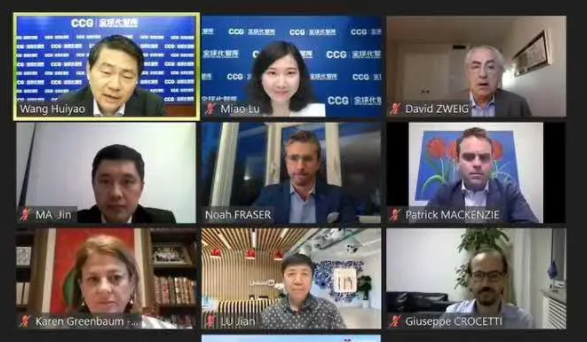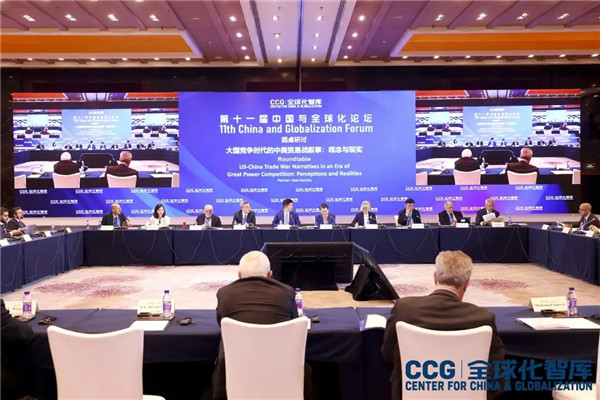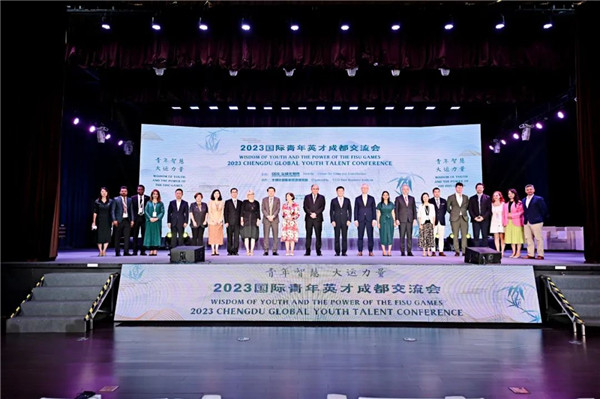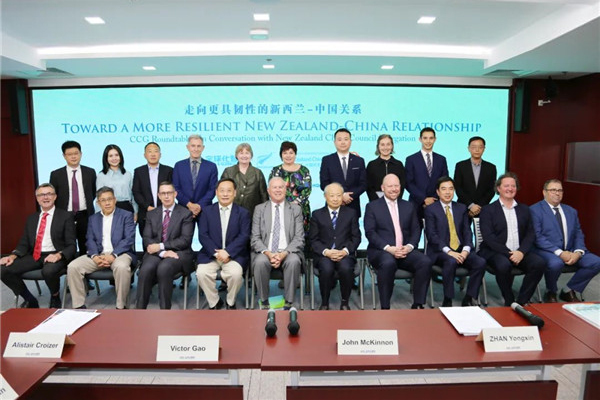The impact of COVID-19 on global talent mobility

Online Video
Youtube
Tencent
https://v.qq.com/x/page/a0978amqsfx.html
Countries around the world have closed their borders and stopped issuing visas and work permits in a desperate attempt to stop the spread of COVID-19. The global mobility of people has come to a near standstill due to the pandemic.
On June 5, the Center for China and Globalization (CCG) and Carleton University co-hosted the first virtual expert discussion on “What are the impacts of COVID-19 on global talent mobility?”, featuring experts from leading think tanks, academic institutions, international organizations and the business community. These experts shared their insights and gave recommendations on how to mitigate the impacts of COVID-19 on talent mobility.

CCG President Dr. Wang Huiyao highlighted the negative impacts of the restrictions introduced by some countries on global talent flows. For example, the recent move to cancel the visas of some Chinese STEM students studying in the US has a negative effect on US innovation in the future. Almost 80% of Chinese PHD graduates in science and technology remained in the USA according to US findings which benefits US economy greatly. Dr. Wang explained that the proportion of American Chinese employees in Apple, Google, and many American enterprises are very high is just a good example. Furthermore, according to the report of the Organization for Economic Cooperation and Development (OECD), a large number of Chinese doctorates and master’s degree holders work in OECD countries, contributing strongly to their economies.
Dr. Wang also said that multilateral cooperation can accelerate the revival of transnational activity. He pointed out that all countries need to build better non-governmental and transnational cooperation and exchange platforms in the post-pandemic era. He introduced CCG’s proposal for an alliance of global talent organizations. This initiative has been positively evaluated and already received support from the international community and selected by the Paris Peace Forum for presentation and discussion for two consecutive years. At present, the initiative is further refined.

Martin Geiger, the Principal Investigator of the CCG-Carleton Project on Talent Mobility and an Associate Professor of Human Migration and Mobility at Carleton University, said that because of COVID-19, there are enormous economic, social and political consequences threatening existing innovation systems and future economic growth, as well as the livelihoods of high-skilled professionals and international students around the world. He said that this expert discussion aims to assess the current situation, impacts of COVID-19 and prevention measures on global talent, as well as talent recruitment and retention focusing on particular talent destinations and industries.

Karen Greenbaum, the President and CEO of the Association of Executive Search and Leadership Consultants (AESC), emphasized that increased unemployment and challenges posed by the pandemic and by countries imposing travel restrictions do not change the fact that attracting and retaining top talent at the executive level remains a top priority. She pointed out several key issues in developing the next generation of leaders. First, leaders should take digital transformation into account, including a demand to change business models to move to a digital environment in the future. She cited a need for strong inspirational leaders who can work in an adaptive and inclusive culture. Moreover, she mentioned the necessity to foster a strong purpose-driven culture that supports innovation and promotes progress. This is why businesses need to reimagine their business, and in doing so they will continue to rely on attracting and retaining top talent. She also expressed her concerns about the negative effects of nationalistic foreign policies on global talent mobility and the global business sector.

Lu Jian, President of LinkedIn China, suggested that one indicator for measuring talent mobility is the hiring rate. According to LinkedIn’s Workforce Report for the United States (released in May), the hiring rate in the US fell by about 1.4% in May compared with April, but dropped 38% compared with the same period last year. The sharpest decline was in April, with a 36.5% drop compared to March. Similarly, some European countries, such as the UK and France, have seen their hiring rates fall by an average of about 40% a year. Lu suggested that enterprises should pay attention to new trends brought about by changes in the world, and constantly adapt and adjust to them. He also said that although China’s hiring rate in February fell by nearly 50% compared with the data last year, China has gradually recovered to the same hiring rate as last year at the end of May. He stressed that China is currently the only country that has almost recovered to the previous year’s level in terms of online hiring.

Giuseppe Grocetti, Chief of Mission at the International Organization for Migration (IOM) in China, said that industries are affected differently by COVID-19. COVID-19 may lead to a longer term decline in business travel, and some even predict the permanent loss of 5% to 10% business travel compared to before the pandemic and any enterprises have been forced to cut staff. Both these trends have negatively affected the international flows of talent. In this context, he also pointed out how male and female talents are affected differently by the pandemic, and changing work arrangements and restrictions imposed on travel and mobility. The mode of business operations and talent mobility are also changing. Online work and communication will become increasingly common in the future. This is likely to create new opportunities for businesses to interact more electronically.

Ma Jin, the Director of the Communication & Cooperation Department at the Bureau of Beijing Talent Work, reported that Beijing is striving to build an international exchange center promoting international exchange and services. By creating a better environment, international talent exchange will become accelerated, aiming to meet the needs of overseas talents in innovation and technology research, social and cultural exchange, and other sectors. Mr. Ma pointed out that in response to the pandemic, Beijing should strengthen international cooperation in an all-round way. He also mentioned that Mr. Chen Jining, the Mayor of Beijing, called for increasing investment and the support for talent at the HICOOL Global Entrepreneur Summit and Entrepreneurship Competition in May. Beijing has launched an app – “EASY BEIJING” – to provide foreign talent with a “one-stop” service, from going through formalities in Beijing to carrying out work, integrating various aspects of life, work and social security.

David Zweig, Professor Emeritus at Hong Kong University of Science and Technology, expressed his concerns about the continuation of talent flows between the US and China. He said that some policies implemented by the Trump administration on talent flows, especially regarding international students, were seriously criticized. At the same time, there is also an ongoing criticial discussion regarding China’s talent programs which form a key part of China’s efforts to reverse brain drain. Companies in Hong Kong are probably adapting to changing environments, however they need to consider their talent attraction and retention. Mainland students will remain an important talent source for the coming years.

CCG Secretary-General Mabel Miao said that although the rising number of Chinese students studying abroad has been strongly affected by the outbreak of COVID-19, China remains the largest source of international students for the United States and other countries. She pointed out that the international conflict brought by the pandemic changed many Chinese parents’ views of Western countries, and as a result, some parents may not send their children to Western countries anymore. Therefore, the growth rate of Chinese students studying abroad may slow down further, and become more diversified with student destinations such as Japan becoming more popular. To help returning students facing challenges in finding employment, she recommended that domestic employers set up more internship programs and offer more positions, use online recruitment methods and also extend their recruitment season to provide overseas job seekers and student returnees with more opportunities.

Patrick Mackenzie, the CEO of the Immigrant Employment Council of British Columbia (IEC-BC), said that talent and labor mobility are equally affected by COVID-19. He explained that British Columbia lost over a quarter-million jobs in April. He pointed out that the ability of government entities to process applications was diminished and language assessments and credential assessments could not take place because of COVID-19. He stressed that Canada’s federal immigration minister has been very vocal in his intention to keep immigration numbers high. Mr. Furthermore, Mr. Mackenzie emphasized that immigration has long been a key pillar in economic growth in Canada and BC, and that there continues strong public support for immigration. He mentioned the need to build a selection system closely which is more aligned with employer needs and to give employers more say in who can immigrate and work in Canada.

Noah Fraser, the Managing Director of China at the Canada China Business Council (CCBC), said that difficulties in the visa application process and the challenges in getting plane tickets have resulted in a large number of high-skilled professionals that are currently not able to return to their work places or to leave abroad to work, leaving a large number of workers idle and the world with a talent gap. The development of online working and learning has brought new opportunities as well as challenges for the employment and the work circumstances of high-skilled professionals.





